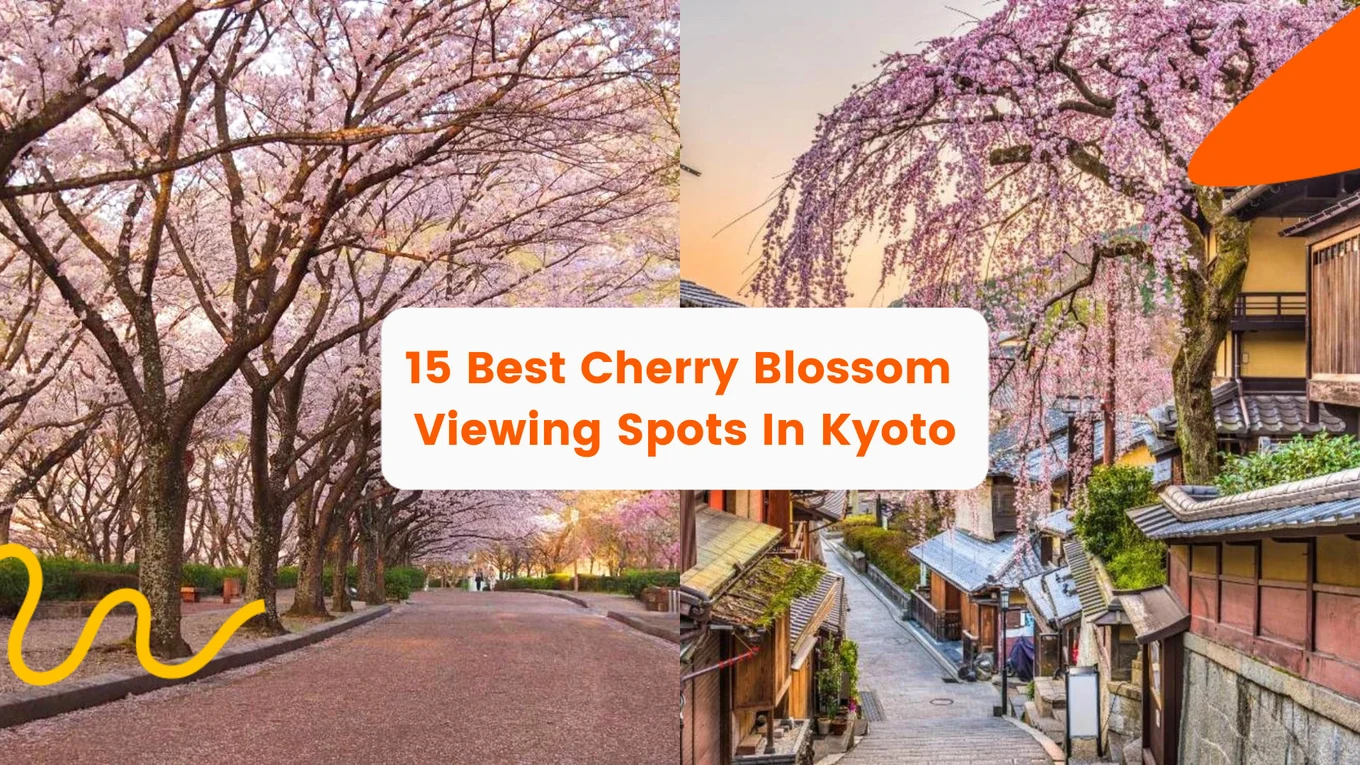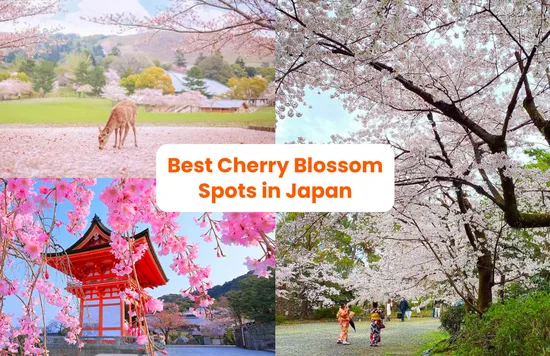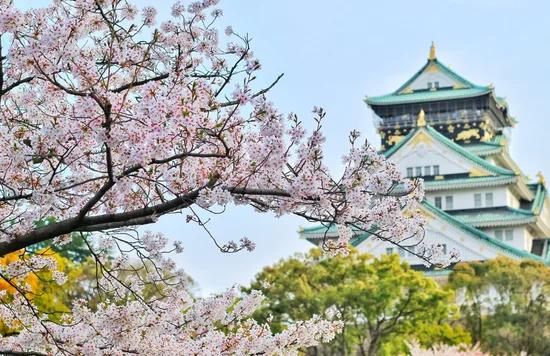Think of Kyoto in spring, think of cherry blossoms 🌸
It's not a trip to Kyoto in the spring season if it doesn't involve sakura viewing in the cultural city. Each year, Japan locals and foreign tourists alike flock to Kyoto to witness the beautiful cherry blossoms against the backdrop of historic temples and gardens.
This year, we're here to help you discover the best cherry blossom spots in Kyoto! From famous viewing spots, to hidden gems, we've shortlisted the top locations in the city that you must visit this cherry blossom season, as well as fun activities to do in the area.
2024 Kyoto Cherry Blossom Forecast
The cherry blossom blooming period in Kyoto is forecasted to begin on the 24 March this year, with peak bloom expected around 31 March 2024. Due to the higher-than-average temperature in February and March, the cherry blossoms are expected to bloom about a week earlier than usual.
In Kyoto, you can also enjoy weeping cherry blossoms and red weeping cherry blossoms in addition to Somei-yoshino. The blooming order begins with the weeping cherry blossom, followed by Yoshino, then red weeping cherry blossoms, so you can enjoy the cherry blossom viewing experience in Kyoto for nearly 20 days from late March to mid-April.
15 best cherry blossom viewing spots in Kyoto
1. Maruyama Park
Maruyama Park is the oldest park in Kyoto, complete with a Japanese garden, as well as home to many restaurants and teahouses. The park is home to the iconic cherry blossom viewing spot in Kyoto, the famous 'Gion no Yozakura', where visitors can see the illuminated weeping cherry tree at night.
When the cherry blossoms start to bloom here, the entire park looks like it is entirely filled with the beautiful pink and white blooms. The weeping cherry blossoms usually remain in bloom until early April, but you can head here after mid-April to enjoy the Yae-zakura, the double cherry blossoms.
📍 How to get here:
Maruyama Park
- 5-minute walk from Exit 3 of Maruyama Koen Station (via Tozai Subway Line)
- Address: Maruyama-cho, Higashiyama Ward, Kyoto Prefecture 605-0071
- Click here for Google Maps
2. Yawaragi Road (Nanatani River)
Yawaragi no Michi is a road along the Nanatani-gawa River that flows through the city of Kameoka in the Tanba region. Cherry blossom trees line the road for about 1km, with around 1,500 cherry blossom trees in full bloom!
There are about 280 cherry blossom trees of 28 different species planted in the Sakura Park that is located adjacent to the road, and the pink gradient effect formed across the landscape here, created by the various types of cherry blossoms is a sight worth seeing and possibly the best viewing spot in the region.
📍 How to get here:
Yawaragi Road (Nanatani River)
- From JR Kameoka Station, take the Kameoka City Furusato Bus and get off at Nanatani River
- Address: 19 Chitose Yokoi, Chitose Town, Kameoka City, Kyoto Prefecture 621-0003
- Click here for Google Maps
Another famous river that flows through the Tanba region is the Hozu River, where you can enjoy a historic rafting experience. In the spring time, you can spot beautiful cherry blossoms blooming along the Hozu River.
3. Kiyomizu Temple
Kiyomizu-dera is one of the most popular tourist spots in Kyoto. There are about 1,500 Yoshino cherry trees and mountain cherry trees planted in the precincts, allowing visitors to enjoy cherry blossom viewing in a world heritage site.
The best viewing spots are at the main hall surrounded by trees from Okunoin, as well as viewing the cherry blossoms from the Kiyomizu stage. In spring, the Special Night Viewing is held every year, and during this period, the trees are lit up, allowing you to enjoy the magical view of the illuminated cherry blossoms at night.
📍 How to get here:
Kiyomizu Temple
- About a 25-minute walk from Kiyomizu Gojo Station (via Keihan Electric Railway)
- Address: 1-294 Shimizu, Higashiyama Ward, Kyoto City, Kyoto Prefecture 605-0862
- Click here for Google Maps
We recommend participating in a half day tour of the Fushimi Inari-taisha Shrine and the Kiyomizu-dera Temple. You can also opt for a package that comes with a local meal at the temple. Solo travelers can enjoy this tour as well!
4. Toji Temple
Famous for its five-storied pagoda, Toji Temple is also one of Kyoto's best cherry blossom spots. In 2006, the 13-meter tall weeping cherry tree Fujizakura was transplanted here, and since then has become a go-to spot for spring sceneries in Kyoto.
Viewed from below, the 55-meter tall, five-storied pagoda and the Fujizakura are lined up side-by-side as if they were comparing their heights, making it a photographable sight. In addition to the Fujizakura, there are many Somei-yoshino cherry trees as well, and the sight of them being illuminated at night is pretty spectacular.
📍 How to get here:
Toji Temple
- About an 8-minute walk from Toji Station (via Kintetsu Line)
- Address: 1 Kujocho, Minami Ward, Kyoto City, Kyoto Prefecture 601-8473
- Click here for Google Maps
5. Heian Shrine Shin-en
The Shin-en Garden in the Heian Jingu Shrine is known as a national scenic spot, and during the cherry blossom season, about 20 different kinds across 300 cherry blossom trees are in full bloom.
A must-see here is the Yae-Beni-Shidare trees. The weeping cherry blossoms against the vermillion architecture of the shrine create such a breathtaking sight. It has been long-adored by many visitors throughout the years and even appears in Jun'ichirō Tanizaki's book, Sasameyuki.
You should also consider viewing the cherry blossoms here at night, as well as experiencing a cherry blossom viewing tea ceremony that is held here for a limited time only.
📍 How to get here:
Heian Shrine Shin-en
- From JR Kyoto Station, take a city bus (No. 5) or Raku Bus (No. 100 / No. 110) and get off at the Okazaki Koen Art Museum / Heian Jingumae bus stop and walk for 5 minutes
- Address: 97 Nishitennocho Okazaki, Sakyo Ward, Kyoto City, Kyoto Prefecture 606-8341
- Click here for Google Maps
After enjoying your cherry blossom viewing experience, we recommend going for a full-course meal at Gion Nanba, a 1-star Michelin restaurant in Kyoto! It takes about a 20-minute walk or 6 minutes by car from the Heian Shrine.
6. Yoshimine Temple
At the Yoshimine-dera, you can find over a 100 Higanzakura, weeping cherry blossoms, wild cherry blossoms, botanzakura, and many other types of cherry blossoms. The 300-year-old weeping cherry tree here is especially impressive - it has become famous since it was featured in the JR TOKAI commercial, 'Let's Go to Kyoto!'.
The weeping cherry blossoms on the west side of Kyoto definitely make it worth a visit!
📍 How to get here:
Yoshimine-dera Temple
- Get off at Mukomachi Station (via JR Kyoto Line), take Hankyu Bus No. 66 (headed for Yoshimineji), get off at Yoshimineji bus stop and walk for 8 minutes
- Address: 1372 Oshiocho, Oharano, Nishikyo Ward, Kyoto City, Kyoto Prefecture 610-1133
- Click here for Google Maps
7. Daigoji Temple
The Daigo-ji Temple is the head temple of the Daigo school of Shingon Buddhism, with historical buildings within such as the national treasure five-storied pagoda and the main hall.
Its history as a cherry blossom viewing spot dates back to the Heian period! Since then, it has been known as Hana no Daigo, and about 700 cherry trees, including weeping cherry trees, Somei-yoshino and double cherry trees, are in full bloom during the flowering season.
The temple has been selected as one of Kyoto's 100 best cherry blossom spots, and is also known for its grand cherry blossom-viewing party, Daigo no Hanami, which Toyotomi Hideyoshi held splendidly back in 1958. Following that, a recreation of this famous party, called Hōtaikō Hanami Gyōretsu is held on the second Sunday of April each year, so be sure to check it out!
📍 How to get here:
Daigoji Temple
- About a 10-minute walk from Daigo Station (via Tozai Line)
- Address: 22 Daigo Higashiojicho, Fushimi Ward, Kyoto City, Kyoto Prefecture 601-1325
- Click here for Google Maps
8. Kurumazaki Shrine
The Kurumazaki Shrine has long been known as a cherry blossom viewing spot, and was once even called the 'Cherry Blossom Palace'. It's famous for its god that brings good luck in fortune, and also said to bring blessings for academics and performing arts.
The highlight of the shrine is that there are many early blooming cherry blossoms, such as the Kawazu-zakura which peaks in early March, and the Kanhi-zakura which blooms in mid-March. There are also many other cherry blossom viewing spots in Arashiyama, which we recommend for you to stop by as well while in the area.
📍 How to get here:
Kurumazaki Shrine
- A short walk from Kurumazaki Shrine Station (via Keifuku Train Arashiyama Main Line)
- Address: 23 Saga Asahicho, Ukyo Ward, Kyoto City, Kyoto Prefecture 616-8343
- Click here for Google Maps
While in Arashiyama, we also recommend getting the Arashiyama Gourmet Coupon that also comes with a 1-day free pass on the Randen train. In addition to choosing 3 of your favourite local sweets from 8 shops, you can also enjoy unlimited rides on Randen!
9. Hirano Shrine
Hirano Shrine was built in 794 and the main hall has been designated as a Important Cultural Property of Japan, along with the Ise Grand Shrine and Matsuo Taisha Shrine. Since the Edo period, it had been called Hirano no Yozakura and is famous nationwide for its cherry blossoms.
There are about 400 cherry trees of 60 different kinds in full bloom in the garden, and many of them include rare kinds! The typical famous cherry blossom types include Kaizakura, Nezamezakura, Hirano Imose, Teyome and Tsutsuhane, while the rare cherry blossoms come in unfamiliar names! How about planning a visit here to catch sight of these rare and precious blooms?
📍 How to get here:
Hirano Shrine
- Get off at Kitano Hakubaicho Station (via Keifuku Electric Railway Kitano Line) and walk for about 10 minutes
- Address: 1 Hirano Miyamotocho, Kita Ward, Kyoto City, Kyoto Prefecture 603-8322
- Click here for Google Maps
Located nearby is the Kinkaku-ji Temple, where you can participate in an evening with a maiko, an apprentice geisha, as well as a night view bus tour of the Takagamine Shozan Garden. You can enjoy Kyoto at night in a way that is unique to this historical city.
10. Taizo-in Temple (Myoshinji Temple)
The Taizo-in Temple has a long history, famous for Hyonenzu, a painting that was designated as a national treasure of Japan, as well as its dry landscape garden, Motonobu no Niwa.
The red weeping cherry trees located within the garden are about 50 years old and hold a unique presence. The best time to see them is around the end of March, and while they bloom early, the colour gradation that eventually happens as the red buds open, as well as the beauty of the plump double flowers are a must-see here.
📍 How to get here:
Taizo-in Temple (Myoshinji Temple)
- About a 7-minute walk from Hanazono Station (via JR Sanin Line)
- Address: 35 Hanazono Myoshinji-cho, Ukyo Ward, Kyoto City, Kyoto Prefecture 616-8035
- Click here for Google Maps
11. Philosopher's Path
Tetsugaku No Michi, known as the Philosopher's Path, is named after one of Japan's most famous philosophers, who was said to practice meditation while walking this route on his daily commute to Kyoto University. It is a 2-kilometre long pedestrian path that has been selected as one of the Top 100 Roads in Japan, and the tunnel created by cherry blossoms in full bloom on both sides provides a romantic scene.
The scenic path follows the course of a shallow irrigation channel and the sight of the cherry blossoms reflected on the surface of the water, as if the pink petals have started to fall and cover the waterway, also creates a pretty atmospheric experience.
📍 How to get here:
Philosopher's Path
- From Kyoto Station, take City Bus No. 100 and get off at Ginkakuji-mae bus stop
- Address: 〒606-8404 Jodoji Shimonamidacho, Sakyo Ward, Kyoto City, Kyoto Prefecture
- Click here for Google Maps
12. Ninna-ji Temple
Ninna-ji Temple holds a history of over 1000 years, founded in the 4th year of the Ninna era, 888. The temple is registered as a World Heritage Site and its precincts are lined with buildings built in the Edo period, such as the five-storied pagoda and the Niomon Gate.
The cherry blossoms at Ninna-ji are famous for their late blooming Omurozakura. The height of the trees are low, at about 2-meters tall - we recommend viewing these trees from standing right in front of them.
The Omuro cherry tree with the five-storied pagoda of Ninna-ji Temple in the background is one of our favourite views. There is no doubt that you will be impressed by this spring scenery that has remain unchanged since the Edo period!
📍 How to get here:
Ninna-ji Temple
- About 10 minutes by city bus No. 26 from Emmachi Station (via JR Sagano Line)
- Address: 33 Omuro Ouchi, Ukyo Ward, Kyoto City, Kyoto Prefecture 616-8092
- Click here for Google Maps
13. Kyoto Botanical Garden
The Kyoto Botanical Garden is a literal plant museum, the concept of balancing both relaxation and learning. There are about 500 cherry trees of about 180 varieties, so you can enjoy the long blooming period from early March with Kanhizakura, Somei-yoshino in early April, followed by the Chrysanthemum cherry in mid to late April.
The best period to head here would be early April, where you'll get to witness a stunning landscape of the contrasting colours between the Yoshino cherry trees and red tulips. From late March to early April as well, the cherry blossoms are lit up at night, so be sure to check it out!
📍 How to get here:
Kyoto Botanical Garden
- About a 1-minute walk from Kitayama Station (via Kyoto Municipal Subway)
- Address: 〒606-0823 Shimogamohangicho, Sakyo Ward, Kyoto City, Kyoto Prefecture
- Click here for Google Maps
How about going south along the Kamo River, which flows next to the Kyoto Botanical Gardens, to enjoy a luxurious Kaiseki meal at Kichisen? Here, you can indulge in luxurious Michelin 3-star Kaiseki sets from Kyoto!
14. Former Imperial Villa Nijō Castle
Classified as a national treasure of Japan, Nijō Castle is one of Kyoto's world heritage sites. Approximately 300 cherry trees of 50 different varieties are planted within the castle grounds. Its cherry garden, the weeping cherry trees on the west side of the Honmaru, as well as the Sendaiya trees in the Seiryu-en Garden are famous.
The recommended period to visit the castle is around the annual Nijō Castle Cherry Blossom Festival. The illumination of the cherry blossoms during this festival and the immersive experience produced by projection mapping against the historical building is a must-see!
📍 How to get here:
Former Imperial Villa Nijō Castle
- Get off at Nijojo-mae Station (via Subway Tozai Line)
- Address: 541 Nijojocho, Nakagyo Ward, Kyoto City, Kyoto Prefecture 604-8301
- Click here for Google Maps
Located next to the castle is the luxury boutique hotel, Garrya Nijo Castle Kyoto, where you can experience a truly lavish stay. From the hotel rooms here, you can view the Nijō Castle and the cherry blossoms in its Japanese garden, granting you a unique stay experience.
15. Iwashimizu Hachimangū Shrine
At the historical shrine of Iwashimizu Hachimangū, Somei-yoshino and mountain cherry blossoms are in full bloom in early April, whil the weeping cherry blossoms and double cherry blossoms are in full bloom from mid to late April.
In April, various festive events such as the Bugaku dedication, as well as martial arts competitions, are held at Iwashimizu Hachimangū. The sight of the Yoshino cherry blossoms blooming against the background of the rōmon gate, which has been designated as a national treasure, is truly breathtaking.
📍 How to get here:
Iwashimizu Hachimangu
- Take the Keihan Railway Cable at Iwashimizu Hachimangu Station and get off at Hachimangu Sanjo Station, then walk for 5 minutes
- Address: 30 Yawata Takabo, Yawata City, Kyoto Prefecture 614-8005
- Click here for Google Maps
The Iwashimizu Hachimangū Shrine is located near the border of Kyoto and Osaka. If you head to Osaka, you can participate in a day tourwhich includes stops at Suntory Yamazaki Distillery and the Asahi Beer Oyamazaki Villa Museum of Art, which is the ony place where you can taste Yamazaki single malt whiskeys, which aren't for sale.







































